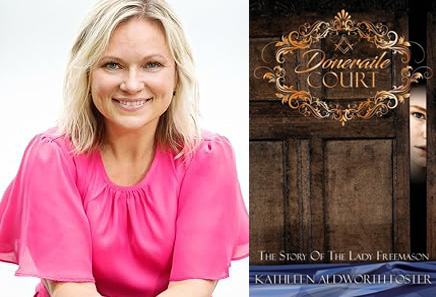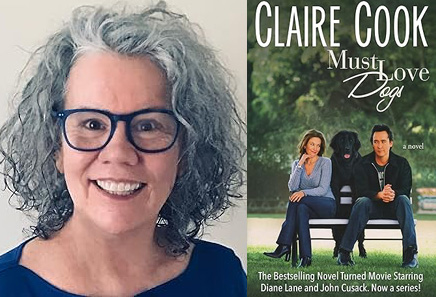Every author has played the game: Who Will Star in the Movie Version of my Book? It’s thrilling to imagine actors we know only from the red carpet bringing life to the world we created on the big screen—or the little screen—or the streaming screen. But there’s one question...how?
My first peek at the transformation of a book into a movie came when Kathleen Aldworth Foster told me that her historical novel Doneraile Court: The Story of the Lady Freemason had been optioned for a TV series.

Kathleen has always focused book promotion on the niche group of Freemasons because her novel is based on a true story that happened to a Freemason organization in Ireland. While in County Cork, Ireland, for a fundraiser, she met a Freemason who was also an actor in Cork County. He loved her book! So much so, that he took it to a production company he worked with, and Kathleen found herself with a book optioned for an Irish TV series.
Fast forward to Kathleen’s return to Pennsylvania, talking about her recent good luck at a local craft fair, when Heidi Bordogna, who is a producer for Sandstone Production, screenwriter, and Fordham University film professor, just happened to overhear while attending the craft fair. They made an appointment to meet for coffee, where Heidi talked to Kathleen about protecting her rights. Kathleen was happy with her agreement with the Irish production company, but she was still searching for an American screenwriter for the adaption. So now, Heidi has agreed to be Kathleen’s screenwriter. Ireland fundraiser + Pennsylvania craft fair = optioned TV series.
Clearly, this was an amazing fluke, and I tried to find someone who went the more traditional route. Someone whose newsletter I’ve been receiving for years is Claire Cook, author of twenty-three books, including one made into a movie: Must Love Dogs. I soon learned that the story of the movie Must Love Dogs could have been one of Claire’s plotlines!

Here’s Claire’s tale: on her Must Love Dogs book tour, Claire stops at a Vermont bookstore. She visits, she signs books, she leaves. A few days later, Gary David Goldberg, producer of Family Ties and other award-winning TV series, stops by with his family and buys Must Love Dogs. After all, there is a big tabletop display of her books, and he does love dogs. In the blink of an eye, he has optioned the book. Success!
Except...in the complicated world of Hollywood, the deal eventually “dies.” Here comes the twist that every story needs: Claire faxes David to thank him for thinking her book was a movie possibility. David is shocked. A person who was turned down sending a thank you note? No one does that.
No one but Claire. Claire and David become pen pals via fax, sharing miscellaneous tidbits from their lives. And eventually, looking for a project about ten months later, David thinks of his pen pal. So, Must Love Dogs becomes a movie because the author said, “Thanks, even though you said no.”
Can your book be optioned without the blockbuster name power of Stephen King, George R. R. Martin, or John Grisham? Yes! There are many authors who have their movie options sold by an agent, including Jeff Kinney’s Diary of a Wimpy Kid, which was released in theaters by 20th Century Fox. Paula Hawkins’s The Girl on the Train was released in theaters by Universal Pictures, and Elizabeth Strout’s Olive Kitteridge, became an HBO miniseries.
Argh! But what about the rest of us who aren’t blessed with the gift of serendipity or bestseller lists? What can we do to make our books into movies or TV series? As you probably guessed, the road to production is fickle, but there are a few things you can do to test the waters.
Who Do You Know?
As you guessed from the experiences of Kathleen and Claire, getting your book in front of the right people is key. What if you don’t know those people? After all, many of us live in Cleveland or Boulder or Little Rock. Not exactly hotbeds for the entertainment industry.
Find out if your literary agency has a branch that focuses on optioning books and if they are pitching your book to the entertainment industry. Even if they don’t directly handle optioning books, your literary agent may have contacts in the entertainment industry they can introduce to you.
What’s Your Logline?
No agent? Remember all that work you did to get a publisher? It’s time to do that again for selling the movie options for your book. At this point you don’t need a screenplay, just your published book (and hopefully brisk sales). For now, you’re selling the idea.
Remember your book’s elevator pitch? When selling movie options you need a logline just like your book needed the elevator pitch. A logline includes the movie genre and one to two sentences about your main character and their goals/evolution. For longer pitches, you should also have a treatment, which is the movie equivalent of a book proposal and includes a synopsis, audience, and why your movie should be made now.
Approach Producers
Remember researching book publishers trying to find the perfect one for your book? Great, because it’s the same process all over again for your screen options. If someone specializes in documentaries, they won’t be interested in your romance. If their last movie had a budget of $700 million, they may not be interested in a pitch from an unknown. Just like book publishers, some will accept unrepresented work, and all will have specific instructions for submissions.
To start your search for a producer, try Backstage, a trade publication for the entertainment industry. Do your research to find out about recent work, awards, and accomplishments of each producer. Use that information to decide on the ideal producers and personalize each query you send.
When They Come to You
Someone has come to you with the proposal that they want to make your book into a movie/TV series. Are the first words out of your mouth: “Where do I sign?”
Instead try: “I have to talk to my agent.”
There is a long road from, “We’re interested in your book,” to “That’s a wrap.”
It may feel like you’ve already done all the hard work, but it’s worth it to have someone, like an agent, on your side who understands Hollywood deals. Literary agents and entertainment attorneys know all the legal jargon and how to protect your rights while negotiating the best deal. If you have a tentative offer on the table, you won’t have any trouble finding representation. Chances are they will come to you asking to be your representative. Some of the largest agencies are CAA, WME, UTA and Paradigm.
So yes, you can work at getting your book out to the entertainment industry by systematically researching, pitching, and negotiating with producers. But along the way, don’t forget those unexpected connections that can lead to a movie deal. Opportunities are everywhere!
***

Jodi M. Webb writes from her home in the Pennsylvania mountains. After a decade hiatus from writing, she is back with bylines in Tea Journey, Mental Floss and a WIP about her plant obsession. She's also a blog tour manager for WOW! Women on Writing. Visit her website at www.jodiwebbwriter.com.